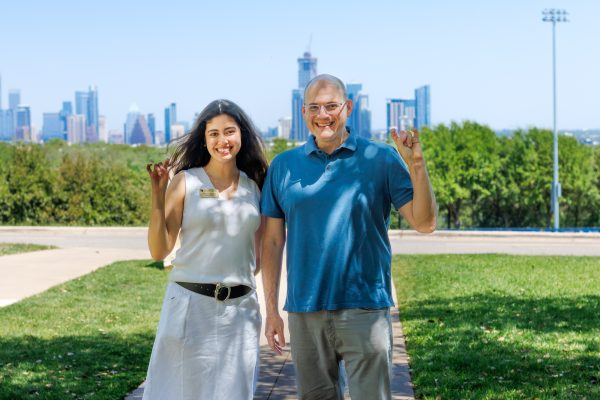Sexual assault on campus prompts investigation

The sexual assault that occurred on campus last month prompted an investigation by the University Police Department, UPD, which led UPD and university staff to reemphasize the importance of reporting any instances of similar cases.
The sexual assault occurred Feb. 10 at 5:50 p.m. in Teresa Hall. The UPD Special Investigator conducted an investigation and no charges were filed. The case is currently classified as “active.”
“The sexual assault case was reported to our office,” said Rudolph Rendon, St. Edward’s University police chief.
More information on the reported assault will not yet been released as UPD cannot give sensitive information such as identities or specific details on active cases.
Sexual assault cases are not a rarity among universities in the United States.
“National statistics suggest that one in four college women are victims of sexual assault or attempted sexual assault in their time in college,” said Elizabeth Charrier, assistant director of the Health and Counseling Center. “Men are victims of attempted or completed sexual assault at a rate of one in ten.”
Many sexual assaults against women go unreported. Assaults against men are even more underreported.
“If there is one message that comes from this, [it] is to really encourage people to report their concerns,” Dean of Students Lisa Kirkpatrick said.
Sexual misconduct offenses include, but are not limited to sexual harassment, nonconsensual sexual contact, nonconsensual sexual intercourse and sexual exploitation.
Sexual harassment creates a hostile or intimidating working or educational environment. According to the Sexual Misconduct Policy, the determination of whether an environment is hostile is based on the frequency of the conduct, the nature and severity of the conduct, the nature and severity of the conduct, whether the conduct was physically threatening or humiliating and the effect of the conduct on the alleged victim’s mental or emotional state.
Nonconsensual sexual contact is any intentional sexual touching despite protest. If a person has sexual activity with someone they know to be mentally or physically incapable of making rational decisions, he or she is in violation of the Sexual Misconduct Policy.
The so-called “date rape” drugs such as Rohypnol, or roofies, can inhibit someone’s ability to make reasonable and rational decisions. The possession or distribution of these drugs is against St. Edward’s policy and federal law.
Sexual exploitation occurs when a student takes nonconsensual or abusive sexual advantage of another for his or her own advantage or benefit. This includes the unauthorized use of pictures and knowingly transmitting an STD or HIV to another student.
If a student violates the Sexual Misconduct Policy and it is determined that intercourse occurred, the resulting sanction will be suspension or expulsion from the university. For sexual misconduct excluding intercourse, the university will conduct an investigation to determine an appropriate sanction. Sanctions can include a warning or modification of living arrangements.
“It is important for us as an institution to look at every situation individually so that we can customize the outcome to fit the circumstances,” Kirkpatrick said.
A student can report the offense confidentially to an on-campus counselor. If an incident is reported to the Dean of Students or UPD, they will conduct an investigation separately, but collaboratively. If it is determined by the Dean of Students that the incident was a violation of university policy, the accused student will receive a notice of violation letter requiring the student to schedule an appointment with the Dean of Students office.
In the event that an accused student accepts responsibility for their sexual misconduct behavior, that student will be sanctioned. If the student denies having been involved in such behavior, a Critical Issues Board will review the gathered information and a hearing will take place. The Associate Dean of Students who acts as the Chief Hearing Officer will determine the sanction if the accused is deemed to have violated the Sexual Misconduct Policy.
“We try to make [the sanction] educational, but sometimes it is punitive. Unfortunately, something like sexual misconduct can be a very egregious offense and it can affect a lot of people,” Kirkpatrick said.
St. Edward’s is required to conduct an investigation whether the UPD has conducted an investigation or not. If the victim of a sexual misconduct offense decides to officially press charges outside the university, UPD will assist with that process and the Austin Police Department will continue the investigation.
“When UPD is investigating a case, they will typically provide us with their report, but it is a separate investigation from ours,” Kirkpatrick said.
A student may be in violation of university policy if sexual misconduct behavior takes place off campus between two St. Edward’s students, and is egregious. The university may investigate the incident.
Alice Gilroy, a UPD police officer, teaches Rape Aggression Defense classes on campus. The next class is in April.
“It is an excellent course to teach women simple and effective ways to defend themselves, but also covers ways to prevent rape by awareness and crime prevention techniques,” Gilroy said.
Students are encouraged to report sexual misconduct. The Health and Counseling Center is available 24 hours a day. Call 512-448-8538 or 512-448-8444 and ask for the counselor on call.






